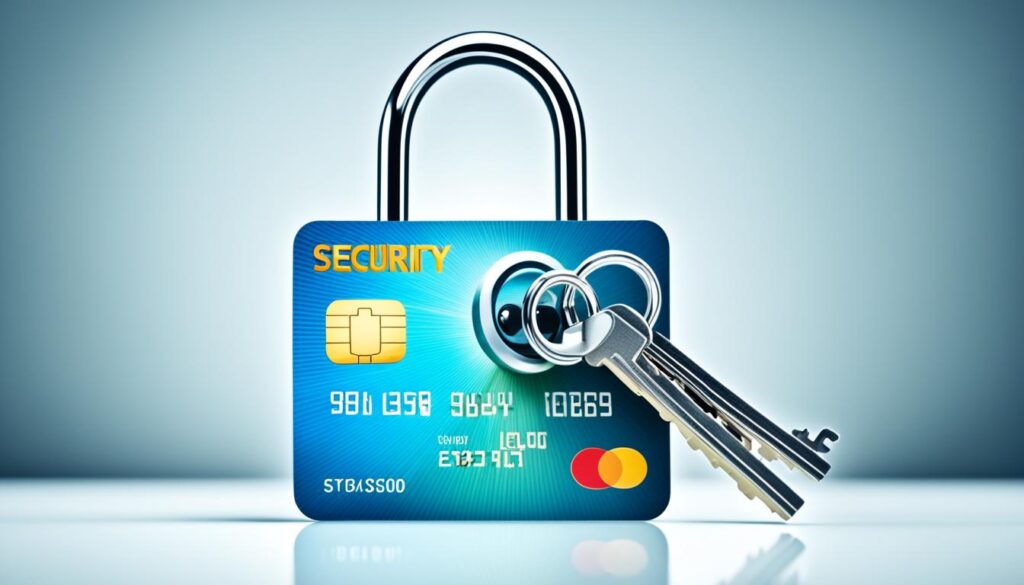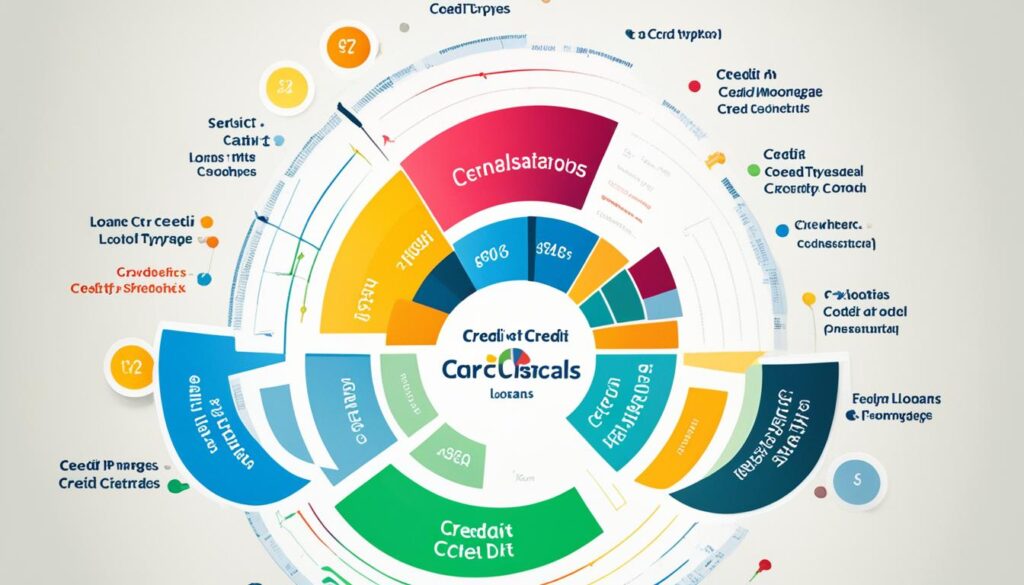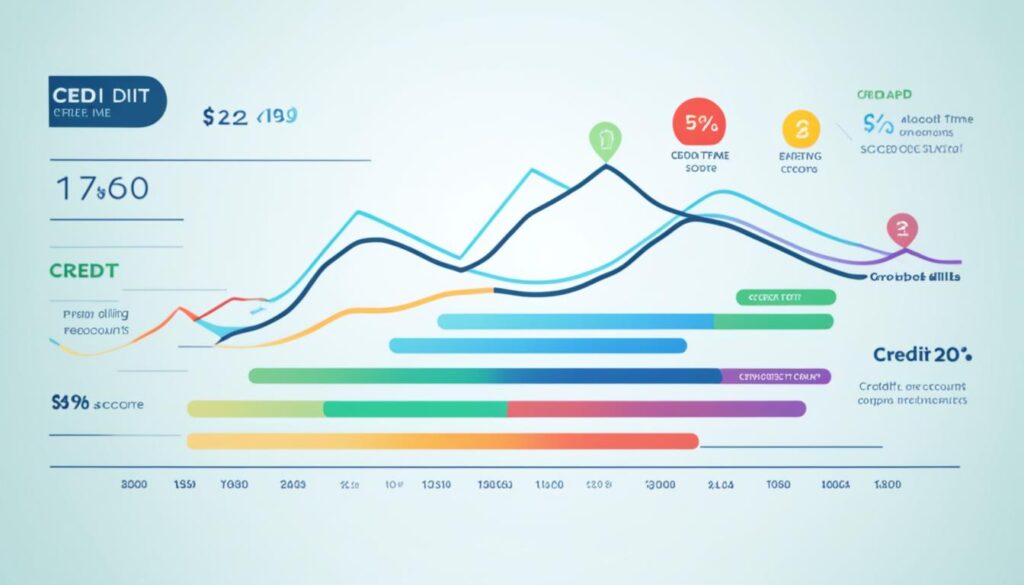Having a low credit score can block your financial dreams and chances. But, don’t worry. You can improve your credit score with some strategies. By following these tips, you can manage your credit better and have a brighter financial future.
Section 1: Use Credit Wisely
Using credit carefully is key to boosting your credit score. Try to pay your full balance each month, not just the minimum. This will show lenders you’re good with credit. It also builds a positive credit history.
Also, be picky about opening new credit lines. Make sure they report to the big credit bureaus. This way, your good credit habits get noticed.
Key Takeaways:
- Pay off your credit card balance each month to demonstrate responsible credit use.
- Choose credit lines that report to major credit bureaus to ensure your responsible behavior is tracked.

Improving your credit score is a journey. It takes patience and persistence. By being wise with credit, you can better your score. This opens the door to improved financial opportunities.
Use Credit Wisely
Improving your credit score is important. Using credit wisely is a key part of this. Here are some tips to use credit well and boost your score:
- Pay off your balance each month: Try to pay the whole balance, not just the minimum. This shows you handle credit well and avoids extra interest.
- Choose credit lines that report to major credit bureaus: Pick credit lines from places that report to credit bureaus. This makes sure your good credit habits get recorded.
By using these tips, you can improve your credit score step by step. Remember, being responsible with credit is crucial for a healthy credit score.
Using credit wisely is very important to better your credit score. Paying the full balance and picking the right credit lines can show you’re good with credit. This helps you get a better score.
Take Responsibility for Your Finances
Taking control of your finances is key to a better credit score and well-being. It means understanding where you stand financially and deciding to improve. This control shapes your financial future.
It’s vital to be honest about how you manage money. Look at how you spend, manage debt, and save. Finding what needs work helps you make a plan.
Every financial choice affects your credit score. Choices like new debts or late payments play a big role in shaping your credit.
Begin by making a monthly budget. List your income, expenses, and savings goals. It shows where your money goes, guiding your spending choices.
Developing Healthy Financial Habits
Here are some tips for smart financial choices and responsible habits:
- Track Your Expenses: Record all expenses to see where you can save more.
- Create an Emergency Fund: Save some income each month for unexpected costs. This keeps you from using credit in a pinch.
- Pay Bills on Time: Always pay bills when they’re due to avoid hurting your credit score.
- Minimize Debt: Work on reducing what you owe, especially on high-interest debts.
- Save for the Future: Put money away for big goals, like retirement or a new home. Investing in the future is key to financial responsibility.
To improve your credit score, be disciplined and consistent. It may be slow, but with smart choices, progress will come. You’re building a stronger credit profile.

Use a Secured Credit Card
A secured credit card is a powerful way to build or fix your credit. You make a deposit that sets your credit limit. Use the card right and pay on time to better your credit score over time.
If your credit score is low or you have no credit history, a secured card is a great start. Your deposit acts as a safety net for the issuer if you don’t pay. It’s easier to get than other cards, especially if you’ve had trouble before.
To use a secured card well, pay on time and keep your balance low. Try to buy small things and pay it all off every month. This shows you’re good with credit and keep debt down.
It’s also key to get a secured card from a good place that talks to the big credit bureaus. This way, your good credit use is noted in your history, helping your score. Look for a card with fair fees and rates to make the most of it.
Benefits of a Secured Credit Card:
- Opportunity to build credit with a low credit score
- Increased chances of approval compared to traditional credit cards
- Demonstration of responsible credit behavior through on-time payments
- Potential to transition to an unsecured credit card in the future
Using a secured credit card wisely can be a big step to a better credit score and future. Start now with a card that fits your budget and needs.

Consolidate and Manage Debt
Combining your debts can greatly help improve your credit score. By managing your debt wisely, you set the stage for better financial health.
Debt Consolidation
Having many debts with high interest can be tough. You may have credit card debts or personal loans. Putting them together into one can be wise.
Merging your debts makes payment easier and may reduce the amount of interest you pay.
This way, you only have one loan to pay off. This simplifies your finances, making it easier to stay on track with payments.
Credit Usage Ratio
Your credit usage ratio is vital for your credit score. It’s about how much of your credit you’re using right now.
| Credit Utilization | Credit Score Impact |
|---|---|
| Less than 30% | Positive impact on credit score |
| 30-50% | No significant impact |
| Above 50% | Negative impact on credit score |
Keep your credit use below 30% to show you’re responsible. Lowering your balances can improve your credit score in the long run.

Pay Bills on Time
Paying bills on time is essential for a good credit score. Late payments can hurt your credit a lot. It’s important to pay on time to show you’re responsible.
Here are some tips to help you stay on top of your bills:
- Set up automated reminders: Use technology to remind you of bill due dates. This ensures you don’t miss payments.
- Create a budget: Knowing your income and expenses helps you manage bill payments better.
- Use online banking: Online banking services let you pay bills easily, avoiding postal delays.
- Set up payment plans: If paying is hard, talk to your creditor about a payment plan. This helps avoid late fees.
- Keep track of due dates: Use a calendar or an app to remember when bills are due.
“Paying your bills on time showcases your financial responsibility, which is a top priority for lenders and creditors.” – Jane Thompson, Financial Advisor
On-time payments mean no late fees and show you’re financially responsible. A good payment history boosts your credit score over time.

| Benefits of Paying Bills on Time | Consequences of Late Payments |
|---|---|
|
|
Maintain Low Credit Balances
Improving your credit score is essential. Keep your credit balances low, it’s a smart move. It shows you’re good with money, boosting your creditworthiness.
“Aim to spend 25% below your credit limit.”
Try to use only 25% of your credit. Spending just a quarter of your limit is wise. It proves to lenders that you’re careful with credit.
Making payments early also helps your credit score. It cuts down interest and betters your credit use fast.
Take Control of Your Credit
- Check your statements regularly to monitor spending and find improvement areas.
- Make a budget to manage money well and prioritize payments.
- Use tools and apps to keep an eye on credit use and payment history.

Keeping your credit balances low and paying strategically helps your score. It’s about showing you use credit wisely and have financial discipline. Stick to these practices for better credit health.
Understand Your Credit Score Factors
To improve your credit score, start by understanding what affects it. This knowledge lets you make smart decisions to boost your score.
Payment History
Your payment history is key to your credit score. Lenders look for consistent, on-time payments to judge if you’re reliable. Late payments or accounts in collections hurt your score. Focus on paying on time to show you’re financially responsible. This helps improve your credit score.
Credit Utilization
Your credit utilization ratio is how much credit you’re using. It’s a big factor in your score. To positively affect your score, keep your credit card balances low. Try not to use more than 30% of your available credit to keep this ratio healthy.
Length of Credit History
Lenders also consider how long you’ve had credit. A long history suggests stability and responsible credit use. Don’t close old accounts, as it can shorten your history and lower your score. Instead, keep these accounts open and in good standing to maintain a diverse credit history.
Credit Mix
A mix of different credit types can boost your score. Lenders want to see you can manage various credit accounts well. This includes credit cards, loans, and mortgages. Only take on as much credit as you can handle. Remember to always pay on time.
New Credit Applications
Applying for new credit affects your score temporarily. Each new application can lower your score a bit through a hard inquiry. To minimize the impact, avoid applying for several credit accounts in a short time.

In Closing
Understanding what affects your credit score is crucial to improving it. Focus on a good payment history, low credit utilization, and a diverse credit mix. By paying attention to these factors, you can enhance your financial stability and work towards your goals.
Monitor Your Credit and Dispute Errors
Keeping an eye on your credit report is key to a healthy financial status. It helps improve your credit score. Spotting errors quickly can prevent negative impacts on your credit.
Monitoring lets you see changes like new accounts or credit inquiries. You can spot any wrong activity fast. This helps you fix those issues quickly.
It’s also crucial to know what makes up your credit score. This knowledge lets you create plans to better your score. It helps you reach your financial goals.
“Regularly monitoring your credit report is like having a pulse check on your financial health. It gives you the power to spot errors and take action to rectify them before they cause significant harm to your credit score.” – Jane Smith, Personal Finance Expert
Disputing Credit Report Errors
When you find mistakes on your credit report, fixing them fast is important. You must contact credit bureaus with proof to show the errors. This protects your credit score.
To start a dispute, here are the steps:
- Contact the credit bureau(s) with the wrong info.
- File a dispute, highlighting the errors with proof.
- Let the bureau investigate by talking to the data furnisher.
- Check the investigation’s result to ensure corrections are made.
Disputing errors takes time but it’s vital for correct credit info. Correcting mistakes can boost your score. It opens up better financial chances.

| Error Type | Impact on Credit Score |
|---|---|
| Inaccurate Account Information | Can result in a lower credit score due to incorrect payment history or credit usage reported |
| Fraudulent Accounts | May significantly impact credit score and indicate potential identity theft |
| Outdated Negative Items | Can lower credit score if negative information remains on the report past the appropriate reporting period |
| Duplicate Entries | May lead to inflated credit balances and a higher credit utilization ratio |
Keep a close watch on your credit report and challenge any errors. This defends your credit standing. Your efforts will reflect your true financial responsibility. Taking control of your credit can give you a stronger financial footing.
Be Patient and Persistent
Boosting your credit score isn’t quick. It needs time, patience, and hard work. Even if changes don’t happen fast, it’s key to keep up with good credit actions.
The road to better credit is different for everyone. It takes while to build credit, and there might be hiccups. But, don’t let those hiccups stop you.
Stick to our advice for raising your credit score. And keep making smart money choices. By doing this, your credit score will slowly get better.